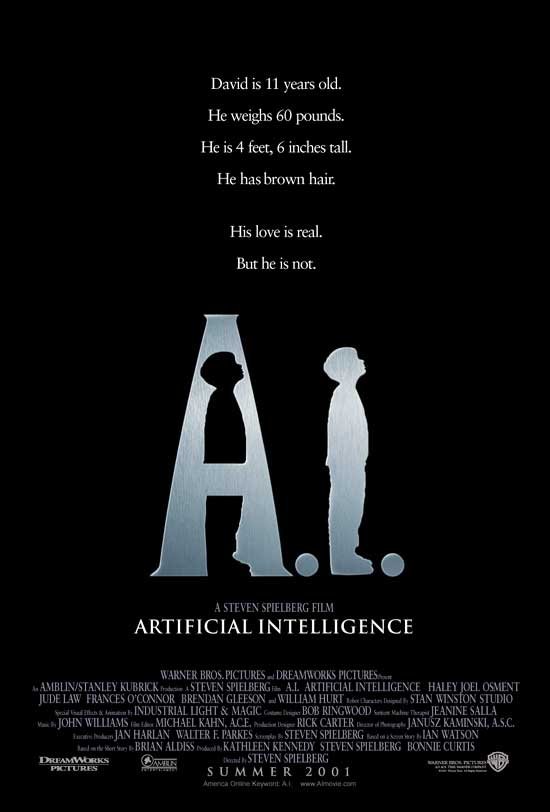A.I. Artificial Intelligence (2001)

Release Date: 29 June, 2001
What's It About: David, a robotic child who is programmed to display emotions, is
The Good: This film was actually meant to be made by Stanley Kubrick, but he passed away before it could be realized. As a result, it contains an unusual mixture of both filmmakers' opposing sensibilities - the bleak Kubrick and the optimistic Spielberg. Kubrick depicts the world as dystopian and forlorn, whilst Spielberg brings his warm-hearted and innocent charm through David. The soundtrack, by John Williams, is excellent
The Bad: Unfortunately some of its strengths are its caveats. Because Kubrick and Spielberg are on opposing wavelengths as directors, there is a strange disconnect between the execution. Part of the Spielbergian magic is to step away from reality and offer us viewers a chance to witness something magical, but Kubrick is always grounding the supernatural in reality. The last scene of the film suffers most in this regard, and although it is the best scene in the film, it ultimately serves as nothing much greater than a deus ex machina to allow David to see Monica one last time.
Best Performance: Haley Joel Osment as David, the mecha programmed to feel love and affection for others. Osment is a child star who rose to critical acclaim in The Sixth Sense, and he was entering the renaissance of his childhood career. Osment plays the role with general ease, introducing uncanny valley elements such as displaying a forced laughter to mimic the children he was with. However, over the course of the film David learns more about emotions and by the end, is able to understand what it means to dream. Interestingly, whilst the other robots in the film look like robots (Jude Law's Gigolo Joe, for example), David looks unmistakably human with his soft hair and human expressions.
Should I Watch It: Steven Spielberg undertook this movie with a great amount of love and care for Stanley Kubrick's vision, and as such, this film is like Kubrick's true final film, realized through Spielberg's hands. It is a strong allegory about humanity and of fate and destiny, especially in the final scene which depicts Earth as completely extinct of humankind. We learn the power of dreams and what they are capable of making us feel, and David serves to show us that dreams are gifts that allow us to see the world as something greater than it is, because he longs for nothing more than just that, and to be with Monica.
Post-Credits Scene: No
Similar Films: Bicentennial Man (1999), I, Robot (2004), Robocop (1987)
Trailer:
Free vote for you! Yay!
woww I had just downloaded it. hahaha what a timing.